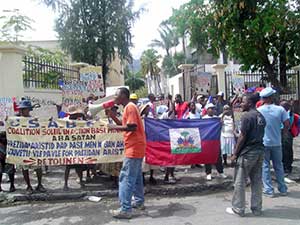Anger over hunger in Haiti bursts out
By
G. Dunkel
Published Apr 10, 2008 8:53 PM
For the past few months poor Haitians have been calling the hunger that they
feel every day “Clorox,” because it is so painful that it feels
like they have drunk bleach.
|
|
Aba Satan (Down with Satan), a community group from Cité
Soleil, a very poor community in Port-au-Prince, held a protest
in front of the Ministry of Commerce and Industry April 1 to make
the government understand the people need relief from high
prices.
Photo : Jean Ristil/Haiti Liberte
|
|
After weekly demonstrations in Port-au-Prince and elsewhere against rapidly
rising prices of basic necessities and gasoline, the growing anger at these
desperate circumstances spilled into the streets.
It began April 3, in Les Cayes, the third largest city in Haiti, about 125
miles south of Port-au-Prince. Five thousand people set up barricades of
burning tires and wrecked cars, stopped at least two food trucks carrying rice,
distributed the rice to the crowd and attacked a United Nations compound.
Sonia Jeanty, 32, told the Haiti Information Project during a telephone
interview from Les Cayes: “We are hungry and have given up on the U.N.
and the Préval government to help us. After all the money they have spent
here, most of us are eating only one meal a day. It’s unacceptable,
especially as we hear the U.N. trying to tell us every day on the radio that
things have gotten better. It’s a lie!”
The U.N. and the U.S. have spent around $2 billion in Haiti in the past four
years trying to stabilize the situation after the last coup against President
Jean-Bertrand Aristide. While the U.N. runs the show in Haiti, it’s the
U.S., with the active cooperation of Canada and France, that calls the
shots.
More people came out in Les Cayes April 4 and again attacked the U.N. compound.
The U.N. soldiers, mostly from Uruguay, fired on protesters who tore down a
wall and attacked two U.N. trucks. Four protesters were killed and 20 were
injured, according to Sen. Gabriel Fortune, who represents the area in
Haiti’s parliament.
Local television network Tele Caramel showed a dead person close to the U.N.
base in Les Cayes. Schools, stores and banks remained closed in Les Cayes on
both days.
Also on April 4, hundreds of people demonstrated against high prices and hunger
in the northwestern port city of Gonaives. U.N. workers there were evacuated to
a police base, although the protests in Gonaives remained mainly peaceable.
Five people in Gonaives, according to the Haitian Press Agency, were injured by
rocks when protesters demanded a school let its students out.
In Petit-Goave, a small city 45 miles south of Port-au-Prince, demonstrators
closed schools, but the cops kept them from attacking public buildings. They
were, however, able to beat up the mayor.
For the past few months a group called Aba Satan (which is Creole for
“Down with Satan”) from Cité Soleil, has been holding
demonstrations in front of the Ministry of Commerce and Industry demanding the
government lower the price of gasoline and basic foodstuffs. The response of
the government has been, “Haiti doesn’t produce petroleum; we
can’t subsidize its price.”
Aba Satan told the ministry head, Magguy Durce, that she should lower the taxes
on these items even if that would cause the World Bank to stop congratulating
Haiti for its “remarkable results.”
As production in the world’s economy spirals down and price inflation
spirals up, the big capitalists use all their powers to protect their
investments by shifting the burden onto their working classes and onto
countries like Haiti.
Haiti’s farmers were bankrupted by the free food coming from all the aid
programs over the past 20 years. The pressure of the IMF and World Bank for
Haiti to only make “profitable” investments has kept it from
developing its tremendous agricultural potential.
Of the 420,000 tonnes of rice Haitians consume yearly, 340,000 tonnes are
imported. Of the 31 million eggs the Haitian population eats monthly, 30
million are imported from the Dominican Republic. About 80 percent of farmers
earn less than 135 dollars a year.
These types of protests have overthrown Haitian governments in the past. If
President Préval and Prime Minister Alexis don’t do anything
concrete—other than demanding respect for private property—they are
going to face more serious mass protests.
Articles copyright 1995-2012 Workers World.
Verbatim copying and distribution of this entire article is permitted in any medium without royalty provided this notice is preserved.
Workers World, 55 W. 17 St., NY, NY 10011
Email:
[email protected]
Subscribe
[email protected]
Support independent news
DONATE


